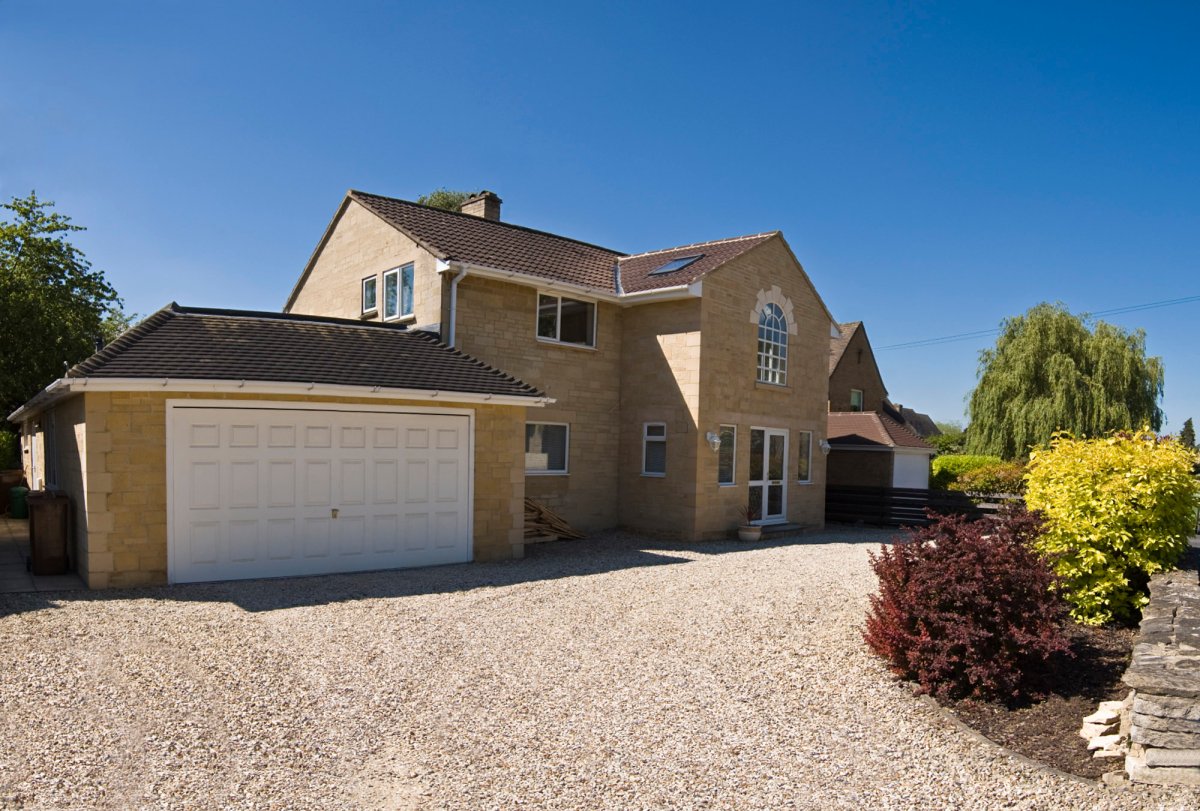We may earn revenue from the products available on this page and participate in affiliate programs. Learn More ›
- Typical Range: $300 to $60,000
- National Average: $1,500
A gravel driveway can be a functional, budget-friendly feature for any home. If you’re interested in an alternative to an asphalt or concrete driveway, gravel may be the way to go. According to HomeAdvisor, gravel driveway costs can range from $300 to a whopping $60,000 for an extra-long driveway. The national average is a more reasonable $1,500, or between $1.25 and $1.80 per square foot for installation. Multiple factors affect the overall cost of a gravel driveway, including the site condition, size, and landscaping needs. The area requires proper drainage to direct water away from the driveway so the gravel doesn’t wash away. A gravel driveway is relatively easy to maintain. All that needs to be done is to fill and replace areas that have sunk or washed away due to weather events. Filling in bare spots and leveling out the driveway typically needs to be done twice a year depending on driveway usage and weather conditions. Although snow and ice removal is more difficult on a gravel driveway as compared to a paved one, a gravel option provides superior drainage. Prices can vary from the national average due to labor costs in your area, the source of materials, the type of crushed stone, and the size of the project. Do an online search to find the best gravel prices near you.
How to Calculate Gravel Driveway Cost
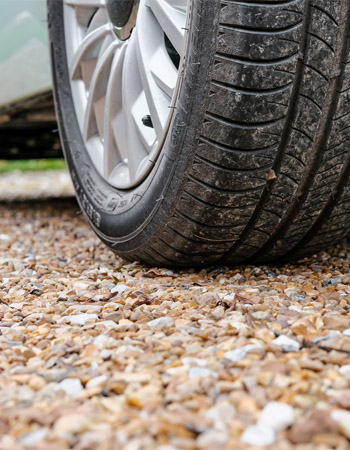
A gravel driveway needs three layers of crushed gravel. Each gravel layer should be between 4 and 6 inches deep. To calculate the amount of gravel you’ll need in cubic feet, multiply the depth (in feet) of all the layers of gravel by the area (length times width, measured in square feet) of the driveway. For example, if a driveway has three layers of gravel that are each 4 inches thick, and it measures 16 feet wide by 38 feet long, the calculation would be:
1 foot x 608 square feet = 608 cubic feet
Add the depth of each 4-inch layer together (4+4+4) to get 12 inches or 1 foot. Multiply the length and the width of the driveway to find the square footage: 16 feet x 38 feet = 608 square feet. To find the total cubic feet, multiply the total depth (1 foot) by the area (608 square feet) to get the total volume of gravel needed (608 cubic feet). Once you have this number, you can consider the types of gravel available and estimate the gravel driveway cost.
Factors in Calculating Gravel Driveway Cost
Calculating gravel driveway cost depends on a few factors. Prices can differ from the national average due to the material type, driveway size, price of labor, required tools and equipment, drainage work, taxes, and permit costs.
Material Type
The amount of material and the type you choose will affect the gravel driveway cost. There are several different types of material for a driveway and the price can run between $0.40 and $2 per square foot. The gravel material is usually priced by the cubic yard or by the ton. Crushed clamshells or plain pea gravel costs around $40 per cubic yard or $50 per ton. If you buy pea gravel in bulk, you may qualify for a discount. Crushed stone runs approximately $55 per cubic yard and $65 per ton. Colored gravel can add an extra $20 to $50 per unit. Prices in your area can vary from the national average due to the source of the material, the type of material used, the cost set by the supplier, and the minimum weight that they will sell to you or a contractor.
Driveway Size
The project’s price depends on the size of the area and the type of gravel you choose. Not only does the length and width of the driveway determine the overall cost, but the depth as well. Professionals recommend the minimum depth of a gravel driveway be 4 inches. The average price for a single-car driveway ranges from $360 to $900, and a parking stall can cost between $400 and $600. A single-car turnaround runs approximately $400 to $600, and a two-car turnaround is $800 to $1,200. A two-car driveway can cost between $1,000 to $2,200, and a three-car driveway can run from $1,500 to $3,000.
Tools and Labor
Labor usually costs around $30 an hour. This price can change because of local labor costs, the difficulty of the job, and the geographic area. Labor rates typically include the cost of supplies and equipment, but check with your contractor. If the new gravel driveway is replacing a paved driveway, prepare to pay more for removal. Concrete removal averages between $250 and $3,000, with the average at $970. Reinforced concrete is more expensive since it’s more difficult to remove. Additional tools like a jackhammer, concrete saw, sledgehammer, or pry bar are needed to remove concrete and will add to the overall price.
Drainage
Drainage systems can cost between $2,000 and $5,500 on average. Drainage is an important part of the project. If drainage isn’t established correctly from the outset, it could lead to bigger maintenance problems in the future. Pea gravel is typically the best for drainage, but all gravel driveways need to direct water away from the driveway and house. This will prevent gravel loss, potholes, and other drainage issues.
Taxes and Permits
Expect to pay anywhere from $500 to $2,000 for a gravel driveway permit. The price difference depends on geographic location, tax rates, and the costs in your area. If you have a homeowners association (HOA) or a local safety office, you will need to check regulations and requirements for installing a gravel driveway. If your project will cover more than 4,000 square feet or it’s near a designated flood zone, you may need a land-disturbance permit. A right-of- way permit may be required if your driveway impacts a street or a public sidewalk, and a permit may be needed if you create a new access point that connects a public or private road or if you are expanding the size of your driveway or creating space for additional parking. For minor improvements or repairs, a permit could cost from $45 to $90.
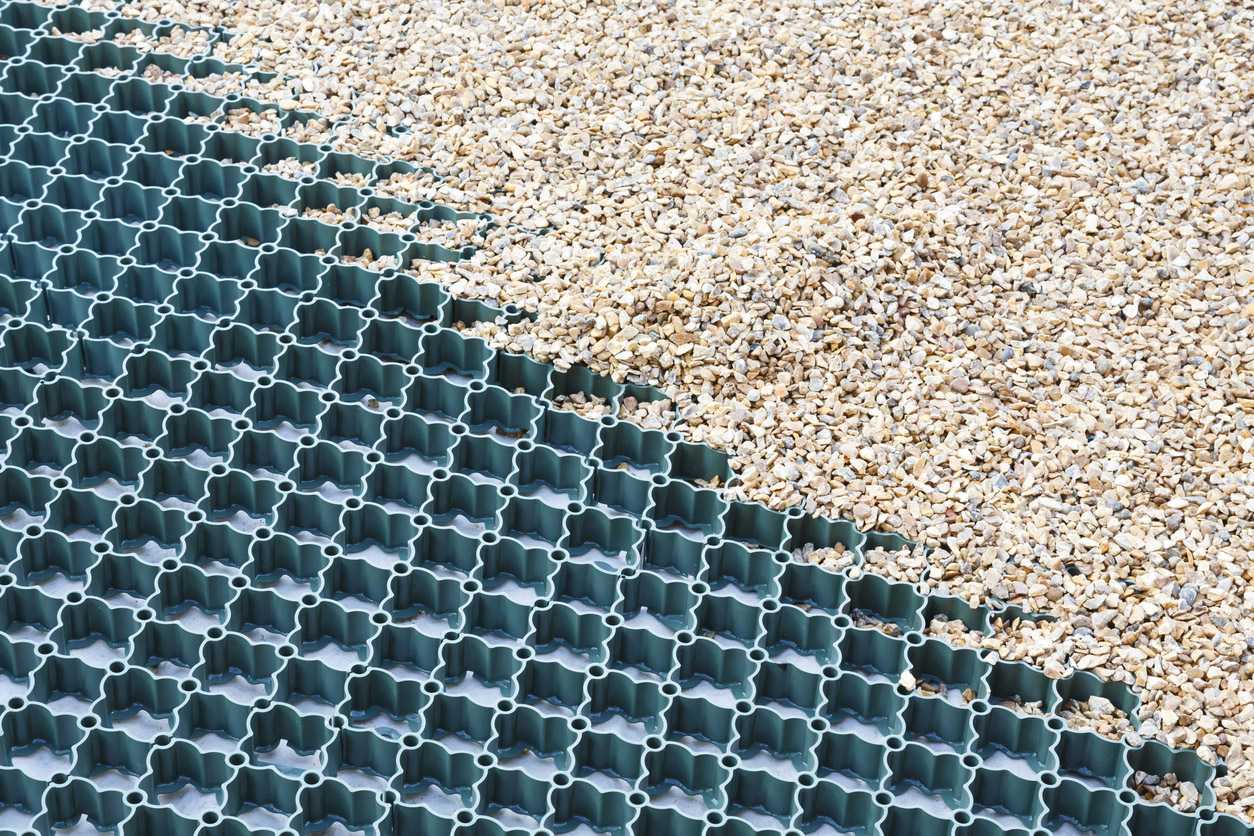
Additional Costs and Considerations
When budgeting for gravel driveway costs, there are usually additional costs and considerations. These can include land preparation and clearing, resloping, and delivery fees.
Land Preparation and Clearing
Land preparation costs can run from $450 to $8,500 or between $1.30 and $2 per square foot, with the average at $2,600. Tree removal costs between $80 and $1,650 or $660 on average. Stump removal can cost between $60 to $360 per stump or $2 to $4 per inch of diameter. If you need extensive land clearing to build the driveway, expect to pay around $400 an hour or between $500 and $3,000 per acre if it’s a heavily wooded location. Digging and excavating to install a gravel driveway can cost $1 to $2 per square foot, depending on the terrain and the condition of the land. Grading a gravel driveway can run between $4 and $8 per square foot, and the cost to grade and excavate an average-size driveway will cost around $700 to $2,500. Some installation companies may include grading and excavating costs in the overall price of a gravel driveway project. Be advised that they may charge extra to haul away the excavated dirt or move it to a different area on your request.
Resloping
Resloping can cost between $400 and up to $5,000, with an average of $1,900. Part of resloping is directing water away from the foundation of your home. By installing metal or wooden edging or bracing, you can diminish the possibility of erosion around your home.
Delivery
Most gravel companies will charge between $50 and $100 for delivery, but the farther away you live, the more it can cost. Some gravel companies will not deliver less than 10 cubic yards, or 9 tons, and others may not deliver less than 20 tons. Keep in mind that delivery fees do not include the cost of installation and spreading. It’s always best to double check the minimum tonnage and cost for delivery with your gravel driveway contractor.
Gravel Driveway Cost: Types of Gravel
The type of driveway gravel you choose affects the cost. Each has its own cost and specific use. In order to choose the best driveway materials, consider the different sizes that are needed for each layer. Generally, the higher the number, the smaller the gravel. Typically, the smallest size is #10 and the largest is #1. The largest stones are used as the base layer and the smallest ones as the top layer. The following are some of the most common types of gravel.
Base Gravel #3 and Item #4
Base gravel #3 is the most common gravel driveway base. Sometimes called clean stone, it’s made of crushed stone that measures 1 to 2 inches in diameter with irregular edges. It can run between $15 and $25 per ton. Along with base #1, base gravel #3 is considered one of the best gravel driveway bases. Item #4 is another standard base layer for gravel driveways. Item #4 is usually made of crushed gravel, dirt, and sand, but it can sometimes contain recycled asphalt, bluestone, or limestone. Item #4 costs between $12 and $22 a ton.
Rock Pebbles
Rock pebbles, also known as river rocks, cost around $1.50 per square foot. A cubic yard runs about $86, and a ton can cost approximately $108. Rock pebbles are typically smooth, have more color variance, promote drainage, and don’t become slippery when wet. This option has a naturally stylish appearance but can be susceptible to shifting, so it’s not recommended for the top layer of a steep gravel driveway.
Crushed Granite
Commonly used as the top layer for a gravel driveway, crushed granite is a mixture of finely crushed granite and stone dust. The fine texture of the dust will settle between the stones and provide a smooth, tightly packed, and long-lasting driveway surface. Crushed granite, or decomposed granite, can come in various colors depending on where it was sourced. It usually costs around $25 to $50 per ton.
Pea Gravel
Pea gravel is made up of smooth and small pea-sized pebbles and provides the best drainage. It’s available in various colors and can cost between $100 and $180 per ton, although buying in bulk may keep costs down. Pea gravel can migrate and fall off the driveway more easily than other types, so it requires more maintenance. Extra gravel needs to be added every year or two.
Crushed Stone and Limestone
The price of crushed stone or crushed limestone can vary widely because it can be bought in several sizes and styles. In small amounts, crushed stone can cost around $115 per cubic yard and $143 per ton. In large quantities, it can run $30 per cubic yard and $65 per ton. If you’re interested in an upscale crushed white marble driveway, it can cost about $2 per square foot. Crushed stone and limestone is highly customizable to accommodate your desired look and style.
Crushed Shell
Crushed clamshells cost approximately $0.60 per square foot, $40 per cubic yard, and $50 per ton, but the final price will depend on the type of shells you choose. Shells for driveway use are typically washed thoroughly. If they do have any scent, they will lose it in a few days. Since the shells will break down into smaller pieces as you drive over them, they provide a consistently stable driveway surface. Additionally, this environmentally friendly material is not prone to forming potholes or ruts. It’s recommended to avoid the use of shells for steeply graded driveways since they will eventually slide to the bottom. Keep in mind that shells are not widely available in all areas of the country, and they’re usually cheapest in the southeastern coastal states.
Caliche
Caliche is a sedimentary rock that’s made of hardened calcium carbonate. It can cost around $0.45 per square foot, $25 per cubic yard, and $32 per ton. A caliche driveway is considered as strong as a limestone cement driveway because of its calcium carbonate composition and since it contains fossilized clay and sand. Caliche is long lasting, and it’s best suited for arid southwestern climates.
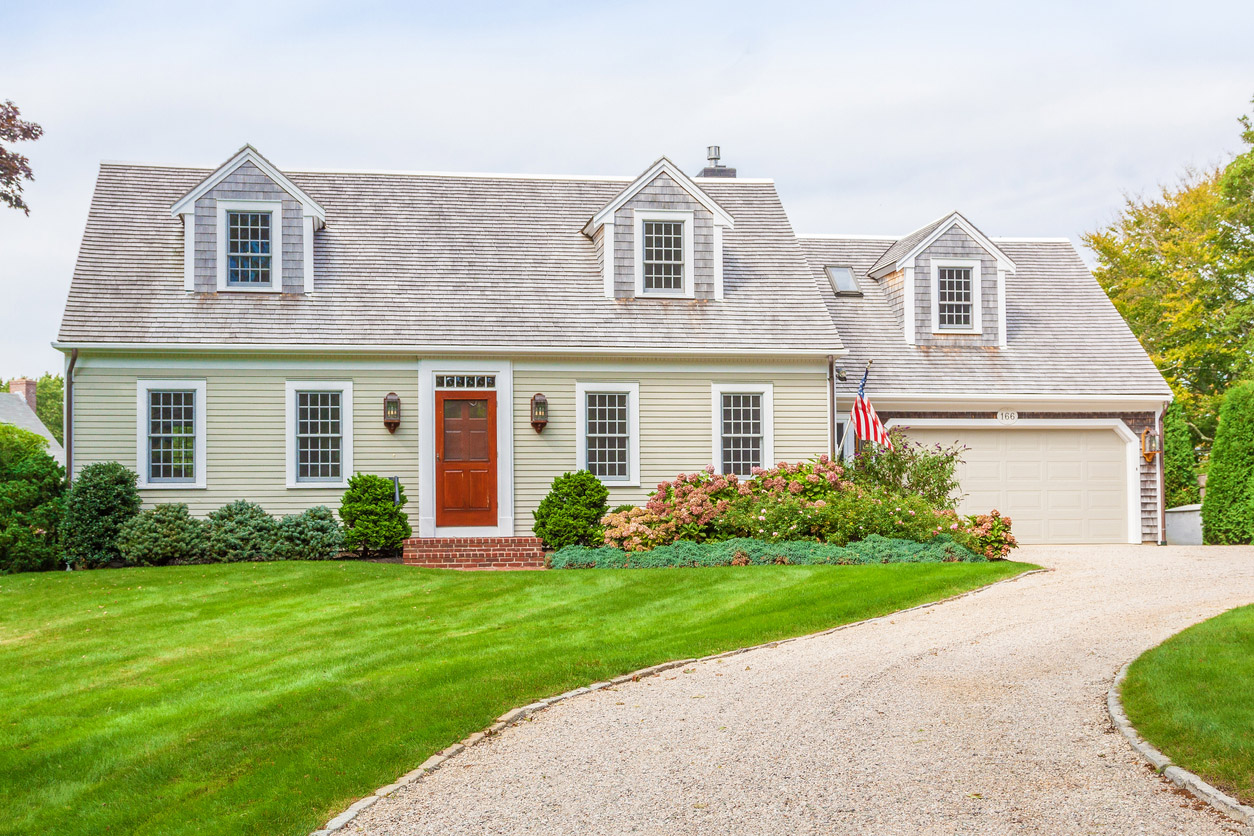
Gravel Driveway Cost: Do I Need a New Gravel Driveway?
A gravel driveway is a budget-friendly option compared to a concrete or asphalt driveway. They can last a long time when properly maintained, but there are a few red flags that signal when it’s time for a new driveway. If you notice an uneven surface, bare spots, or pooling water, chances are you need a new gravel driveway.
Uneven Surface
A gravel driveway should have an even surface with no bare spots or pockets of lumpy gravel. If one side is higher than the other, it can cause drainage issues that can culminate in the driveway washing away or traction troubles while driving. An uneven gravel surface may also affect traction when driving across the driveway during wet weather. If the driveway hasn’t been evenly installed, a professional contractor will need to re-level the entire driveway.
Bare Spots
The crushed rock of gravel driveways should be at least a few inches thick. When the gravel migrates or washes away due to rain and snow removal, it will need to be filled in. Thin areas and bare spots will fill with water, and that can lead to potholes. Fill in any bare areas with fresh gravel to maintain the minimum driveway depth.
Pooling Water
Areas where gravel has migrated will fill with water when it rains. These areas can become deep ruts or holes and will result in the gravel washing away. Ensuring the driveway is crowned for drainage helps, but sometimes ditches or drain pipes are needed to keep the driveway well drained.
Age
Gravel driveways need a lot of maintenance to keep them in good shape. The gravel needs to be raked to be kept even, and additional gravel needs to be added every 2 to 4 years. The driveway may also need to be recrowned for proper drainage. If a gravel driveway has been neglected for many years, it may have to be regraded with new gravel.
Gravel Driveway Cost: DIY vs. Hiring a Professional
An experienced DIYer could tackle this project and save on gravel driveway costs, but installing a gravel driveway takes a lot of effort: clearing the land, staking out the area, calculating the amount of gravel needed, leveling the ground, and spreading the tons of gravel. By DIY-ing a gravel driveway project, you can save on labor costs, but you’ll have to spend money on earthmoving equipment, tools, and material. If you want to save time and avoid the backbreaking work, it’s worth hiring a professional. Keep in mind that you will have to hire a professional if you don’t correctly grade the driveway to make sure you have proper drainage.
How to Save Money on Gravel Driveway Cost
Gravel driveway costs can be high, and the additional costs associated with the project can quickly add up. One way to save on gravel driveway costs is to buy the cheapest material, but there are other ways to save without compromising on quality.
- Buy in bulk. Buying bulk gravel from a stone yard is cheaper than buying bagged gravel from a local home improvement store.
- Skip the delivery. By getting the materials yourself, you can save on delivery charges.
- Make all the purchases yourself. Consider buying all the materials yourself and hire contractors for the installation.
- Get at least three quotes. When shopping around for prices, get at least three detailed quotes from reputable contractors. To find prices that fit in with your budget, search online for “gravel prices near me.”
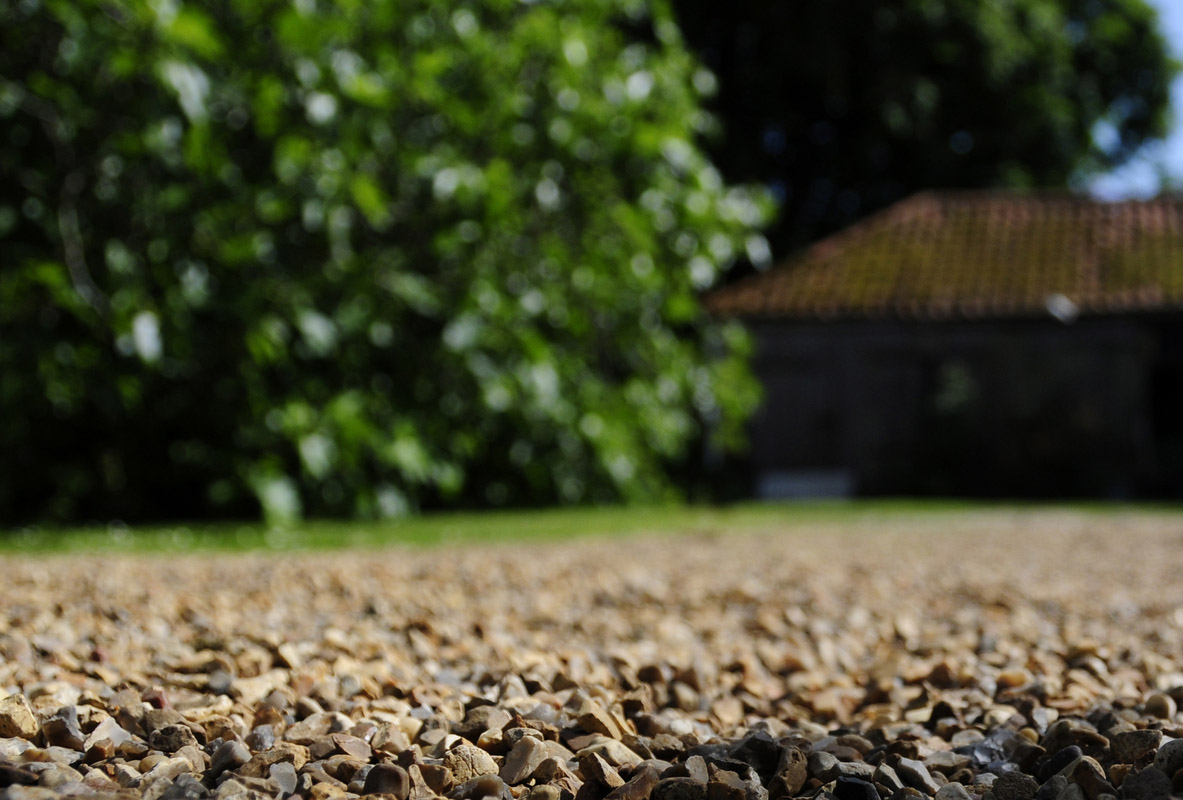
Questions to Ask About Gravel Driveways
Asking a professional the right questions about gravel driveway cost can minimize miscommunication, save money, and get the desired results. Here are some questions to ask gravel driveway professionals.
- Are you licensed, bonded, and insured?
- Do you have references?
- Can you show me examples of your past work?
- Do you offer payment plans?
- Who will install the driveway?
- How long will the driveway last?
- How should I maintain the driveway?
- How do I winterize the driveway?
- How long will the project take?
- What guarantees do you offer?
FAQs
Deciding on the right gravel driveway for your home while staying within your budget can be a daunting process. Here are some frequently asked questions about gravel driveway costs to help guide you in your decisions.
Q. How long will my gravel driveway last?
A gravel driveway can last up to 100 years with proper maintenance.
Q. How do I maintain my gravel driveway?
Gravel driveway maintenance involves raking the gravel to keep an even surface, fixing potholes to avoid vehicle damage, pulling weeds, maintaining drainage, and avoiding snow plows. Leaving an inch or two of snow on the gravel driveway will provide extra traction when driving on it. Avoid frequent shoveling to ensure the gravel will remain in place for a longer period of time.
Q. What is the average cost of a gravel driveway?
The average cost to install a gravel driveway is between $1.25 and $1.80 per square foot. The cost of a 16- by 38-foot driveway is around $1,500. Gravel driveway costs can run the gamut from $300 on the low end to up to $60,000 for a very long driveway.
Q. Is a gravel driveway cheaper than a concrete one?
A gravel driveway is a more budget-friendly option than paving with concrete, which runs from $4 to $15 per square foot.
Sources: HomeAdvisor, Angi, Homeserve, HomeGuide, Fixr

